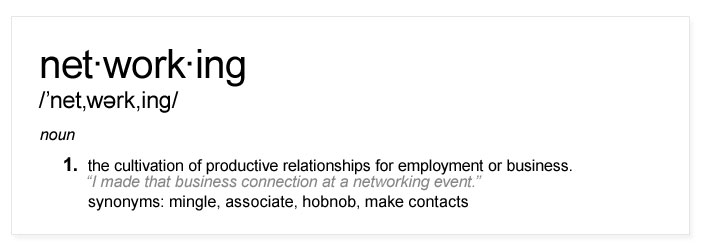what matters is not what you know, but who you know. So, you might ask, if a very skilled, creative person is not well-connected, there’s a chance he may not land great opportunities simply because his network is not that wide? I dare to answer yes.
 The Center for Career Development defines networking as the use of contacts to acquire information, advice, and referrals for the job hunt. Contacts can range from your closest friends to professionals you have met before. It is always easiest to start networking with the people to whom you are closest: friends, family, neighbors, present and former co-workers/employers, faculty, classmates, and anyone else with whom you have frequent contact.
According to the Pew Research Center, an average American has 634 contacts made up of friends, families, relatives, work colleagues and business acquaintances. You won’t get to interact with at least half of these people so much, but the other half may include those who would be able to introduce you to another ten or so contacts who could pave the way for you to snag that contract or get that dream job.
Here are four reasons why working on expanding your network, whether personal or professional, could help you get ahead.
1. A good network could land you a job.
The rise of social media has made job-hunting so much easier. Take LinkedIn, for example. All you have to do is post your resume, add friends and colleagues in your network, go around and try connecting with your friends’ friends and viola, a headhunter could email you anytime there’s a job opening that fits your qualifications. Of course, the good old rule of posting an impressive and accurate resume still follows but it surely doesn’t hurt to have the right people in your network list.
2. Your network could provide the employees you need.
If finding a job is difficult, finding the right employee with the right attitude is more difficult. Employers rely heavily on referrals to find the right fit for their company in the past years. It’s more productive and fool-proof that way. If a reliable friend or employee recommends this equally hardworking guy he met at a digital forum last year, chances are, this guy would turn out to actually be one.
3. Constantly meeting people builds your confidence.
You wouldn’t really equate someone with a huge network to be painfully shy, would you? Going to all these conferences, meetups and workshops provides an opportunity not only to network, but to socialize and interact with other people, making it easier for you to hone your social skills. As you become more confident to introduce yourself to more people, you’ll be able to grow your network and benefit greatly from it.
4. You have reliable people to bounce off ideas with.
One of the advantages of having a network of like-minded individuals is that you have a ready pool of resource persons whenever you need someone to validate an idea of yours. Entrepreneurs understand the travails of starting up entrepreneurs so they’re the best people to be friends with if you’re looking at setting up your first venture. It also wouldn’t hurt to include those who have different interests from yours. If you’re a non-techie guy, wouldn’t it be awesome to have geeks and nerds in your network whom you could easily run to should you have a technical question? The bigger and more diverse your network, the better.
Of course, networking works both ways. You just can’t be the one benefiting all the time. You also have to do your share and reach out and help those who may need your expertise. Your grow your network not only to reap the advantages, but to also pay it forward.
The Center for Career Development defines networking as the use of contacts to acquire information, advice, and referrals for the job hunt. Contacts can range from your closest friends to professionals you have met before. It is always easiest to start networking with the people to whom you are closest: friends, family, neighbors, present and former co-workers/employers, faculty, classmates, and anyone else with whom you have frequent contact.
According to the Pew Research Center, an average American has 634 contacts made up of friends, families, relatives, work colleagues and business acquaintances. You won’t get to interact with at least half of these people so much, but the other half may include those who would be able to introduce you to another ten or so contacts who could pave the way for you to snag that contract or get that dream job.
Here are four reasons why working on expanding your network, whether personal or professional, could help you get ahead.
1. A good network could land you a job.
The rise of social media has made job-hunting so much easier. Take LinkedIn, for example. All you have to do is post your resume, add friends and colleagues in your network, go around and try connecting with your friends’ friends and viola, a headhunter could email you anytime there’s a job opening that fits your qualifications. Of course, the good old rule of posting an impressive and accurate resume still follows but it surely doesn’t hurt to have the right people in your network list.
2. Your network could provide the employees you need.
If finding a job is difficult, finding the right employee with the right attitude is more difficult. Employers rely heavily on referrals to find the right fit for their company in the past years. It’s more productive and fool-proof that way. If a reliable friend or employee recommends this equally hardworking guy he met at a digital forum last year, chances are, this guy would turn out to actually be one.
3. Constantly meeting people builds your confidence.
You wouldn’t really equate someone with a huge network to be painfully shy, would you? Going to all these conferences, meetups and workshops provides an opportunity not only to network, but to socialize and interact with other people, making it easier for you to hone your social skills. As you become more confident to introduce yourself to more people, you’ll be able to grow your network and benefit greatly from it.
4. You have reliable people to bounce off ideas with.
One of the advantages of having a network of like-minded individuals is that you have a ready pool of resource persons whenever you need someone to validate an idea of yours. Entrepreneurs understand the travails of starting up entrepreneurs so they’re the best people to be friends with if you’re looking at setting up your first venture. It also wouldn’t hurt to include those who have different interests from yours. If you’re a non-techie guy, wouldn’t it be awesome to have geeks and nerds in your network whom you could easily run to should you have a technical question? The bigger and more diverse your network, the better.
Of course, networking works both ways. You just can’t be the one benefiting all the time. You also have to do your share and reach out and help those who may need your expertise. Your grow your network not only to reap the advantages, but to also pay it forward.
Has networking helped you through your career? Leave me a comment below to keep the dialog going.
image credit: www.ad2sd.com]]>
